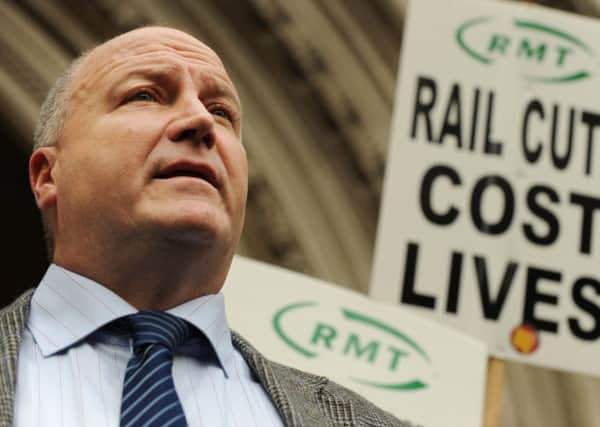Obituary: Bob Crow, union leader


Bob Crow was a straight-talking trade union leader who ferociously championed his members’ rights, in the process becoming a controversial and divisive figure in union politics. Crow was the general secretary of the National Union of Rail, Maritime and Transport Workers (RMT) and a member of the general council of the TUC.
He was an ardent socialist (he described himself as a communist/socialist) and was regarded by many industrialists and politicians as a member of the Awkward Squad, a name to which he would probably not object. But Crow, however much the public derided him for his industrial stances – especially the recent London tube strikes – remained a proud and committed union leader. Indeed, since he became the RMT’s leader, the membership increased fourfold.
Advertisement
Hide AdAdvertisement
Hide AdCrow was an uncompromising firebrand leader of the Left. He recently stated: “You’ve got to recognise that the job you do ain’t about being nice. The job we do is about defending our members. And as far as I’m concerned, if I can get job security and decent pay for my members I couldn’t give two hoots about being unpopular.”
Crow was born in East London, the son of George Crow, who was also involved in union politics, and his grandfather was Punch Crow – a well-known local boxer. He attended Kingswood Upper School and at 16 started working for London Transport. He soon got involved in union politics and in 1983 was elected local representative to the National Union of Railwaymen (NUR) and was awarded the union’s youth award. Three years later Crow became NUR national officer for track workers.
Crow was active in organising strikes throughout the 1980s. In 1982, on the day he returned from honeymoon, he joined a picket line of tube workers demanding better pay. In 1990 various unions connected with the transport industry merged to form the RMT and Crow was appointed the London Underground’s representative on the National Executive. His progress up the union ladder was confirmed in 1992 when he convincingly won the ballot to succeed Jimmy Knapp as general secretary.
Crow strongly upheld the rights of his members to strike and vociferously spoke on their behalf. His heavy East End brogue rather cast him as a union leader of the past: aggressive and the archetypal militant firebrand. But Crow was articulate and marshalled an argument with ease and dexterity on television.
Crow was never a member of the Labour Party and vehemently opposed Margaret Thatcher’s reform of the union movement. He fiercely resisted John Major’s privatisation of the railways and the public service reforms of Tony Blair’s government. He once said ruefully that New Labour’s only legacy was the rise of the BNP.
He grandly shrugged off the ire of London commuters last month and was unrepentant in advancing his members’ interests.
The basic pay for tube drivers under his stewardship rose to more than £50,000 with generous overtime rates. He negotiated special terms when London held the Olympics.
But his personal affairs were often the butt of media attention. His £145,000-a-year salary was criticised as excessive but in an interview broadcast on Monday evening’s PM Programme on Radio 4 he insisted he deserved the money.
Advertisement
Hide AdAdvertisement
Hide Ad“I am worth it, yeah. Our members, in the main, have had pay rises every single year, right the way through austerity.”
He was also often criticised for continuing to live in a rented council house.
On the eve of the 48-hour walk-out over plans to close ticket offices at all London Underground stations, Crow was photographed swimming in a pool on a Caribbean cruise. Unapologetic as ever, he blew away the criticism.
Crow always wanted to improve the working conditions of his members but many found his politics a touch impractical. For a period he was a member of the Arthur Scargill’s Socialist Labour Party. He opposed the EU and monarchy, canvassing for Tony Benn as president. Crow also believed fervently in restoring the death penalty.
Crow remained a hard negotiator, who knew how to spin out meetings until the 11th hour and then get the best result for his union. He turned round the RMT and, while other unions were being marginalised, raised its profile and fought successfully for its members. His grandfather may have been Punch Crow, but Bob was more of a political pugilist.
As well as being a passionate Millwall FC supporter Crow, a sturdy man who favoured an upmarket flat cap, was fascinated by the forecasting of the weather. He spent much free time studying maps and graphs and kept a barometer in his garden. He is survived by Nicola Hoarau, their daughter and a daughter from a previous relationship.
Alasdair Steven